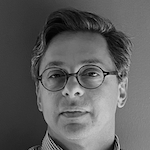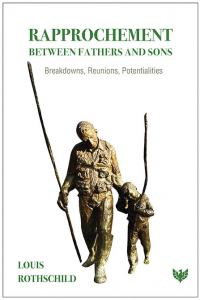
Louis Rothschild, PhD, is a clinical psychologist in Baltimore County, Maryland. Specializing in psychoanalytic psychotherapy, he also provides supervision, writes, and occasionally reviews manuscripts. His publications have ranged from quantitative to qualitative, social-cognitive to psychoanalysis, and clinical to philosophical. Most recently, he penned an epilogue for Salman Akhtar’s edited book ‘Truth: Developmental, Cultural, and Clinical Realms’, and co-edited ‘Precarities of 21st Century Childhoods: Critical Explorations of Time(s), Place(s), and Identities’ with Michael O’Loughlin and Carol Owens. Outside of his professional life, Louis has a fondness for tennis, triathlon, and chasing a rather elusive sourdough starter in the kitchen.
Louis’s latest book ‘Rapprochement Between Fathers and Sons: Breakdowns, Reunions, Potentialities’ illuminates fatherhood as a time of potentiality and active development for both parents and children while simultaneously revealing nurturing capacities as central to masculinity.
In addition to mountain biking and beachcombing, as an undergraduate in the San Francisco Bay Area, I became fascinated by Freud’s scientific fairy tale about a band of brothers who kill their domineering if not psychotic father, and subsequently need to negotiate feelings of aggression and guilt. Alongside historian of narcissism Christopher Lasch, Kleinian feminist Dorothy Dinnerstein, and historian of political psychoanalysis Russell Jacoby, I encountered Herbert Marcuse’s Eros and Civilization.
Marcuse had also enjoyed a California beach life that his position at UC San Diego facilitated. In reading Eros and Civilization, I left the tranquility of the ocean and began to picture that the Freudian band of brothers had been transported to an urban landscape as though Freud’s and Marcuse’s respective work was illustrated in artist Robert Longo’s depiction of distressed cosmopolitans shown in his Men in Cities series. I began to think, ‘It’s all about THE FATHER!’ An undergraduate thesis had been born.
Good poetic critique was found in professor, Beat poet David Meltzer who quipped, that my thesis read as though I was a kid who had put on my fathers suit. Indeed, I’d latched onto something very big, and David’s linguistic father play existed in a context of loving encouragement to keep on.
New York, and the New School were of tremendous help in that regard. There, a little growth was found in a suit of psychoanalytic psychology that at times can feel Kafkaesque; as though one day it fits, another, the sleeves appear to have grown longer. The work is never finished, and as Winnicott notes, it’s a challenge to be alive, and a continual struggle to return to a starting point. Bion harmonizes in saying that digestion can take years, as does Michael Eigen’s idea that breakdown and recovery rhythms are part of the human condition.
A child is father to the man.
As I labor to articulate in my book, becoming a father is transformative. It is Robert Grossmark’s writing that riffs on Lacan to make a case, that ‘a father’ is vastly different than ‘The Father.’ The felt particular rhythms that locate us as living beings inside and outside of our families and consulting rooms matter as these are the places and spaces in which we grow.
In the first chapter of my book on fathers and sons is a remembrance of having a bag of medicine in one hand and my kid in the other while procuring soulful medicine from a brick and mortar video store. We found solace then in the film Finding Nemo, and that present reignited my undergraduate and graduate studies.
Winnicott dedicates Playing and Reality to his patients who paid to teach him. Listening to fathers surfing profound experiences in transference and countertransference fortunately does change us, and being alive becomes increasingly textured.
I continue to feel that I am growing into and enjoying my suit.
Louis Rothschild
Pre-order your copy of ‘Rapprochement Between Fathers and Sons: Breakdowns, Reunions, Potentialities‘ now! Due to be published November 2023.
